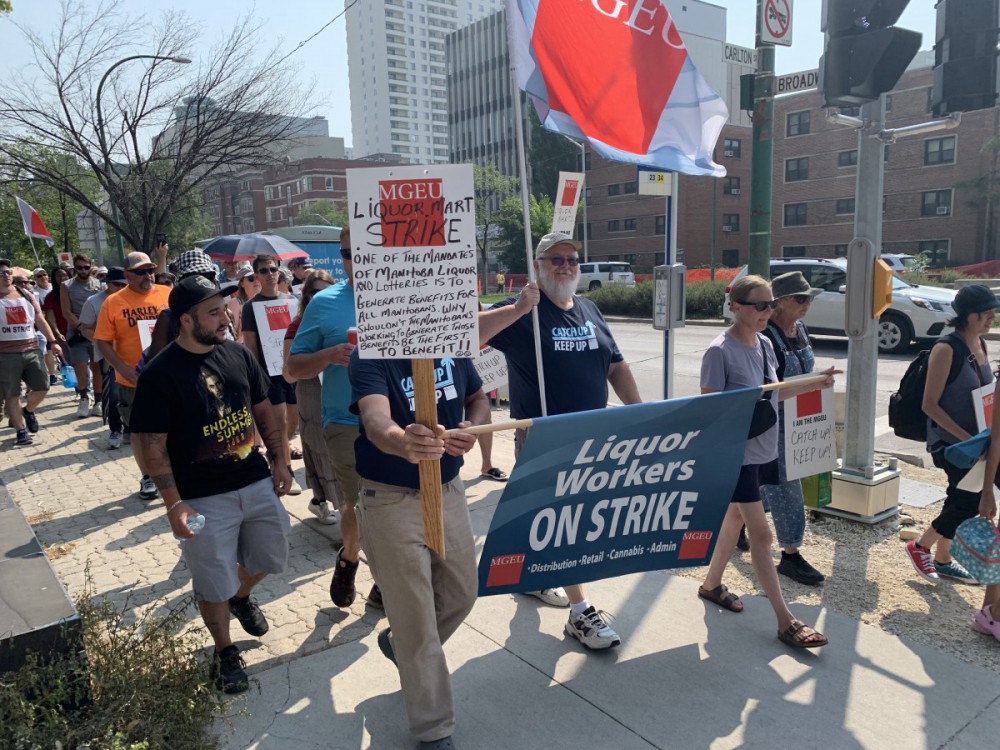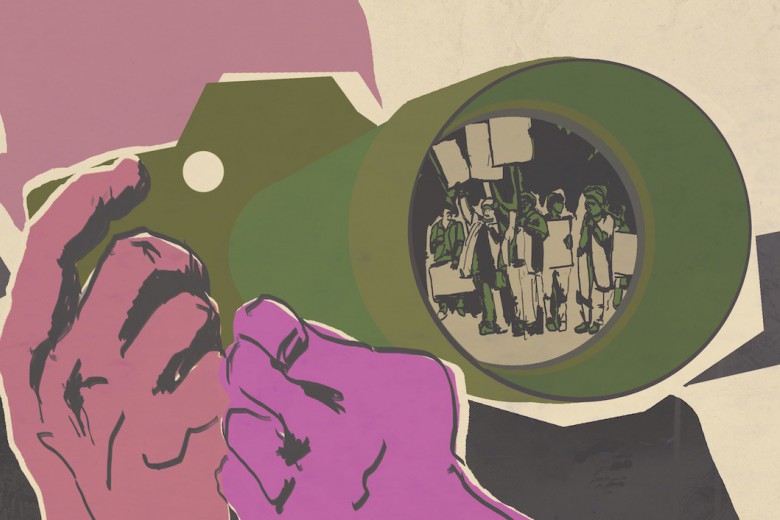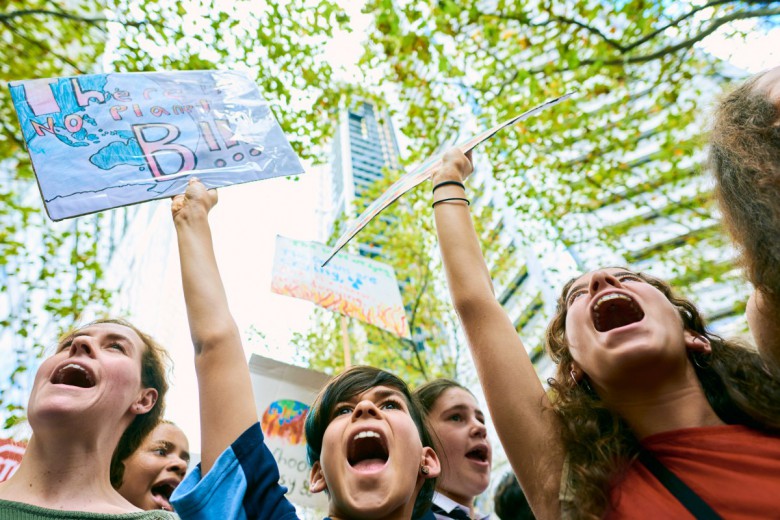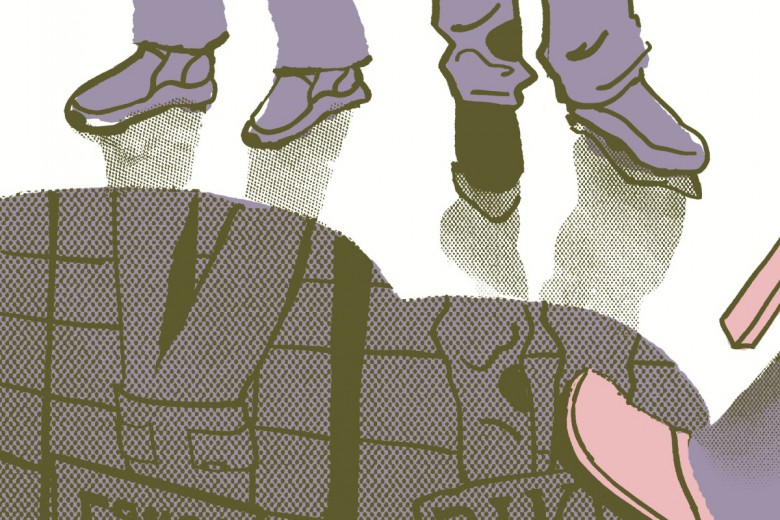After three longs weeks on strike, Jane* began to worry that the mood on her picket line was darkening. As a member of the Manitoba Government and General Employees’ Union (MGEU) and co-captain of her picket line, she has long prided herself on being “good at keeping up morale,” she says. But her employer, Manitoba Public Insurance (MPI), was refusing to meaningfully respond to the union’s wage demands and her colleagues at the rural MPI service centre were growing weary.
On the morning of September 15, 2023, however, her good spirits couldn’t temper the anger on her picket line. Through a mass email, MPI contacted its 1,700 insurance adjusters, driving examiners, and other employees throughout Manitoba to tell them how they could cross the picket line and work during the strike.
As Jane remembers, “I was horribly offended by that email. We were all disgusted by it.” Realizing that her employer would rather encourage workers to scab than sit down and negotiate was, as Jane describes, “a gut punch.”
Employers in the federal jurisdiction employed scabs in 42 per cent of strikes and lockouts between 2012 and 2022.
The experience of Jane and her MPI co-workers is unfortunately all too common. Employers across Canada regularly use “scabs” – or “replacement workers,” as management calls them – to perform the work of striking union members. This undermines the primary power that workers have: their collective power to strike.
At the time of writing, only Quebec and British Columbia prohibit employers’ use of scabs, but there is mounting pressure to pass similar legislation in other Canadian jurisdictions. For Jane and workers like her, it can’t come soon enough.
Undermining labour’s power
Over the past several decades, the balance of power in collective bargaining has tipped decidedly in employers’ favour. A significant decrease in the annual number of strikes in Canada is a strong indication of labour’s declining power.
In the late 1970s, it was common to see more than 1,000 strikes per year across Canada as organized labour exercised its collective power to win gains for workers. By contrast, in the last decade there has been an average of just 164 work stoppages per year. A slight surge in job actions following the COVID-19 lockdowns in 2021, while promising, unfortunately did little to reverse this long-term trend. With labour on the back foot, bosses are emboldened to undermine the strikes that do occur.
Evidence suggests that calling in scabs is employers’ strategy of choice.
Businesses may pay scabs rates above those of striking union members.
As Justin Trudeau’s government has disclosed, employers in the federal jurisdiction employed scabs in 42 per cent of strikes and lockouts between 2012 and 2022. In Manitoba, nearly 35 per cent of work stoppages between 2016 and 2023 involved the use of scabs, according to the Canadian Centre for Policy Alternatives (CCPA). Unifor also reports that employers used scabs against its members in over 10 per cent of their strikes between 2013 and 2021.
Canada’s industrial relations model is premised on unions and employers each accepting limitations on their actions to encourage stability. Unions enjoy security in the forms of automatic membership dues and an expectation that employers will bargain in good faith. In exchange, the right to strike is limited and strictly policed. The window of time when workers can lawfully withhold their labour is small – only once every few years, when their collective agreement has expired and they’re at a bargaining impasse with their employer over a new one.
For some time now, however, it seems that many employers have withdrawn from this unstable detente.
Despite historically low strike levels, as well as average union wage settlements that haven’t kept pace with inflation, employers appear perennially committed to undermining workers’ power by using temporary replacement workers.
Subverting union democracy
Most workers don’t make the decision to go on strike frivolously. Strikes can be extremely taxing mentally, physically, and financially. When a strike is called, it’s a conclusion arrived at democratically by union members, usually as a last resort.
For Sean Jackson – formerly an assistant manager at Manitoba Liquor & Lotteries (MBLL) in the Winnipeg area – striking was the necessary response to years of government-imposed wage suppression.
As Jackson recounts, “our union negotiations went on for a long time. We started bargaining after the previous contract expired and continued for another six or eight months after that. It came to a head in the summer [of 2023] when we realized that our employer – and the province of Manitoba – had a [bargaining] mandate limiting our potential wage increases. This is after we just had legislation that held our wages down for years.”
"We weren’t asking for astronomical wage increases. [...] We just wanted year-to-year increases that reflected the cost of living."
The successive Progressive Conservative governments of Brian Pallister and Heather Stefanson had imposed wage restraint through legislation and various “mandates” given to public-sector employers in Manitoba. Between 2017 and 2021, the government limited wage increases to a cumulative 1.75 per cent for 120,000 public-sector and Crown corporation workers. Staring down the prospect of yet another paltry wage settlement, MGEU members at liquor marts and distribution centres had had enough.
With a strike mandate in hand, the union brought a tentative agreement to the membership for a “single-question vote,” where a rejection of the employer’s last offer also meant hitting the picket line.

Jackson helped draft union bargaining proposals and was then part of a group within his union that met members around Winnipeg to explain the employer’s offer and to answer questions about the tentative agreement and a potential strike. Though ultimately up to the membership to decide, the union leadership encouraged workers to vote “no” on what it considered a subpar offer from MBLL.
At MPI, government interference similarly restricted the Crown corporation’s wage offer and influenced the union’s decision to strike. “In four of the previous six years, we received zero wage increase. We weren’t asking for astronomical wage increases. MPI publicly made it seem like they were offering high wages and the union was rejecting it, but we just wanted year-to-year increases that reflected the cost of living,” Beth,* an adjuster at MPI, says.
At both MBLL and MPI, union members frustrated with years of wage restraint made the difficult decision to strike. It’s safe to assume many of them didn’t expect their employers to respond by replacing them with scabs.
Employers ignore workers’ grievances
When union members are forced out on strike, it can feel like their grievances are simply being ignored. It doesn’t help when the employer appears to be surreptitiously recruiting scabs.
Union members at MBLL’s liquor stores and distribution centres found out on their own that their employer was attempting to bring in replacements.
As Jackson explains, some of MGEU’s part-time members at liquor marts are retired from previous full-time jobs and are supplementing their pensions. “These older people get up early,” he says jokingly. Early one morning, his partner – also a MBLL employee – received a text from an older member who’d found a job advertisement that seemed to be aimed at recruiting scabs. “By 5 a.m., I was emailing our staff representative and saying, ‘is this what I think it is?’”
In Manitoba, nearly 35 per cent of work stoppages between 2016 and 2023 involved the use of scabs.
After members confirmed that their employer was indeed hiring scabs, “a flurry of texts and emails” circulated throughout the union. Following this, local media reported that the Crown corporation was hiring replacement workers and anger among members grew. “Everyone was furious. It was insulting,” Jackson recalls.
To add insult to injury, MBLL was offering scabs wages higher than what was being proposed to striking union members, according to Jackson.
Businesses may pay scabs rates above those of striking union members, but as Jackson points out, scabs typically don’t receive benefits, a retirement plan, or any of the other union protections secured in a collective agreement. Nevertheless, seeing that your employer is willing to pay a premium to crush your strike is understandably frustrating.
Despite often costing more in the short run, replacement workers allow employers such as MBLL to avoid the bargaining pressure created by work stoppages and wait out striking union members.
When employers used scabs during their strikes between 2013 and 2021, the average work stoppage lasted 265 days, but when no scabs were involved, the average strike was settled in just 42 days.
As workers at MBLL and MPI recount, it is especially difficult to see provincial Crown corporations engage in this behaviour.
Both MBLL and MPI are public purpose Crown corporations whose boards of directors are appointed by the Government of Manitoba. Although Crown corporations are in many ways structured like private companies, they are also distinct in important ways. They’re wholly owned by governments, and they ostensibly serve the public. In other words, they have a social purpose beyond simply generating revenue and profit. It’s particularly offensive, therefore, when Crown corporations like MBLL and MPI hire scabs and try to undermine the democratic decision of their workers to strike.
Yet the public character of MBLL didn’t seem to influence how the company treated its workers or how it appeared to be conducting itself in front of the Manitoba public. Rather, through their use of scabs, both MBLL and MPI openly ignored the legitimate grievances of their unionized workforces.
Raising tensions on the picket line
It’s widely recognized that scabs increase the chances of violent confrontations on picket lines. Union members collectively choose to strike, often facing serious economic uncertainty because of that choice. Seeing other workers – whether outside scabs or fellow union members – cross a picket line and perform union work generates anger and resentment that can sometimes erupt.
As frustration intensified among members at MBLL over the employer’s use of scabs, Jackson and other picket captains coordinated through a group chat and tried to ensure the situation didn’t boil over.
“We knew that the use of scabs in the ’70s and ’80s [at other workplaces in Manitoba] had led to violence and we didn’t want that kind of negative publicity. So, we tried to ignore them [the replacement workers] and not engage with them.” As Jackson admits, however, there were some confrontations between scabs and union members at MBLL distribution centres. Try as unions might to prevent such incidents, it can be difficult to contain members’ anger as they watch scabs cross picket lines and undermine their strike.
When workers learned of people crossing MPI picket lines, “we were all miserable, dumbfounded, and just in disbelief.”
Scabs can also drain the energy from a strike and leave union members feeling deflated. In Jane’s case, being in a rural area meant that news of picket line crossings had unique impacts. “We were a very small group. If one person was angry or sour, it rippled through the whole line.” When workers learned of people crossing MPI picket lines, “we were all miserable, dumbfounded, and just in disbelief,” she remembers. “It was also our first indication, I think, that ‘wow, this is going to go on for a while.’” Jane and her co-workers knew well that MPI using scabs meant that their bargaining power was being weakened and that the strike would persist.
Moreover, interpersonal conflict between union members who return to work and those who remain on strike can linger well after the picket lines come down. As Beth at MPI recounts, a co-worker who crossed the picket line has a leadership role inside her workplace and now “walks around saying how much she hates the union.” Beth says “it’s made it difficult and uncomfortable for a lot of people in the office.”
Finding out her employer was using replacement workers was also extremely upsetting for Beth and some of her co-workers. She explains how those employed as driving examiners – who undertake significant training to perform their jobs – were shocked that the employer would bring in scabs with insufficient training to perform their jobs. “Examiners were like ‘they have people doing our jobs without proper training? Do they even care about road safety?’”
Not only was the company undercutting union members, but it was also jeopardizing the health and safety of replacement workers in the process.
As Beth and her co-workers recognize, employers’ use of scabs can put health and safety at risk, including among replacement workers themselves.
At MBLL, there were similar health and safety concerns. Jackson and his co-workers knew that senior managers not in their bargaining unit had plans to maintain scaled-down operations at some liquor stores during the strike. But the union didn’t anticipate that the Crown corporation would be bold enough to hire scabs at distribution centres. Work inside these warehouses involves operating machinery such as forklifts and requires considerable training. Not only was the company undercutting union members, but it was also jeopardizing the health and safety of replacement workers in the process.
Prolonging strikes
Jackson had hoped and expected that MGEU’s strike at Manitoba Liquor & Lotteries would last only a couple of weeks, that his union could disrupt the employer’s operations just enough to influence the latter at the bargaining table. A short strike, he thought, would generate sufficient public support to help workers win. But with replacement workers engaged, it appeared MBLL felt far less pressure to negotiate or settle. “I don’t know for a fact, but it looked like replacement workers allowed the employer to walk away from the table and wait us out,” he surmised.
Jane at MPI also thought their strike “certainly would have been a lot shorter” without the employers’ use of scabs.
The experiences of workers at both MBLL and MPI are borne out by research on replacement workers. When employers use scabs, strikes tend to be longer. According to Unifor, when employers used scabs during their strikes between 2013 and 2021, the average work stoppage lasted 265 days, but when no scabs were involved, the average strike was settled in just 42 days. In Manitoba, the CCPA found that strikes involving replacement workers lasted nearly 22 days longer than strikes where no scabs were used.
If Manitoba already had in place an anti-scab law, Jackson says the MBLL strike would have been different. “It would have created fairness at the negotiating table.”
The prolonged strikes at both MBLL and MPI were in part the result of the actions of the previous Progressive Conservative government and its unwillingness to negotiate with labour. As Jane comments, “If it hadn’t been for the change of government, maybe we’d still be on strike.” Yet the threats posed by anti-union governments make replacement worker bans even more important. The option of replacing striking workers only encourages recalcitrant governments, Crown corporations, and other employers with unionized workers to dig in further and delay bargaining.
As strikes drag on, crossing the picket line may start to look like a rational choice for some workers. For example, Beth described a pregnant co-worker who returned to work because she needed to accrue sufficient hours to qualify for maternity leave benefits. The longer employers can prolong a strike, the more likely it is that workers are forced to make difficult decisions.
If Manitoba already had in place an anti-scab law, Jackson says the MBLL strike would have been different. “It would have created fairness at the negotiating table,” he explains. “Had those replacement workers not been in a position to assist the employer and prolong the strike, there might have been more pressure on the employer to settle. Replacement workers were a lifeline to the employer that allowed it to continue business operations,” he concludes.
Workers clean up the mess
The negative effects of employers using replacement workers can last well past the end of a strike.
“I’ll be honest,” Beth says, “I feel much more impacted by people crossing the picket line now that we’re back at work than I did when I was on strike. We’re still suffering the consequences of the company and the previous government’s poor decision making. We’re dealing with a huge backlog of work because of how long the strike was.”
Having untrained and unqualified people performing bargaining unit work only made matters worse. According to Beth, people doing union members’ work at MPI were “mishandling claims, paying claims where the person didn’t have coverage. There was fraud attempted, claims paid that shouldn’t have been.” It’s now up to MGEU members to sort through what they describe as a mountain of work.
Workers know it’s time for robust bans on scabs in every Canadian jurisdiction.
As Jane put it, “The number of errors we came back to, it would have been better if they had just left the work alone. It was such a mess.” Jane reported that she’s now working additional overtime out of an obligation she feels to MPI customers who have been waiting long periods of time for service. “Some customers have lost patience, and it’s understandable. I listen to their complaints, but I want to tell them, ‘if you have further complaints, email [former Manitoba premier] Heather Stefanson or your current MLA [member of the Legislative Assembly].’”
Workers’ hopes that governments will finally take action to prohibit scabs and rebalance labour relations may be coming to fruition.
The federal government has recently tabled legislation to ban the use of scabs in federally regulated industries, though it could be some months before the law takes effect. Meanwhile, the recently elected New Democratic Party government in Manitoba appears poised to introduce its own provincial ban on scabs following a concerted campaign from organized labour to put the issue on the provincial agenda.
Although these are promising developments, it will nevertheless require considerable pressure from rank-and-file union members to not only push these bills over the finish line but also to ensure employers aren’t able to water them down.
*Jane and Beth are using pseudonyms to protect themselves from employer reprisal.




_780_520_90_s_c1.jpg)


